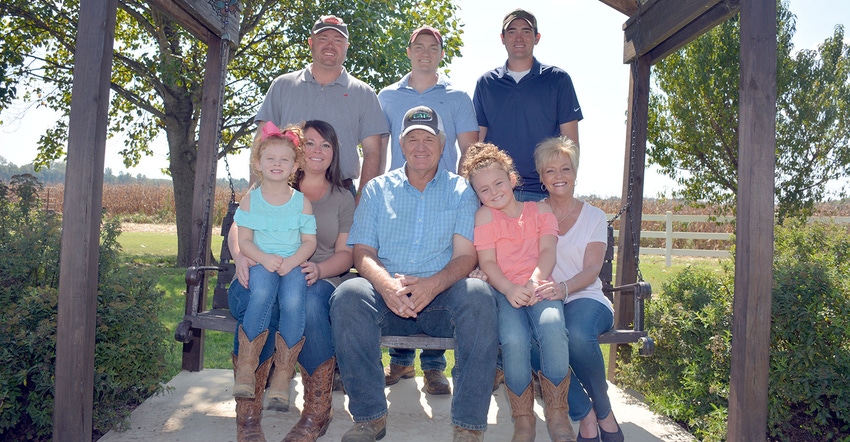
Passing down a family farm through nearly two centuries depends on stewardship and a commitment to make the land better every time it passes from one generation to the next.
Conservation, conservative economic principles and a strong commitment to faith and family have kept the Grills family farm, in Dyer County, Tenn., intact through nine generations.
Jack Grills and his three sons, Rusty, 37, Hunter, 31, and Cody, 29, say they feel blessed to continue operating a farm that has been in the family since the 1800s.
They grow corn, soybeans and triticale.
Conservation, they agree, is now, and has been, a crucial part of the farm for generations.
Building the soil has been a priority.
Jack’s father started installing tile years ago to improve drainage and limit erosion. “We’re still adding tile,” Jack says.
They do it with a bit more precision now, laying it out with GPS coordinates.
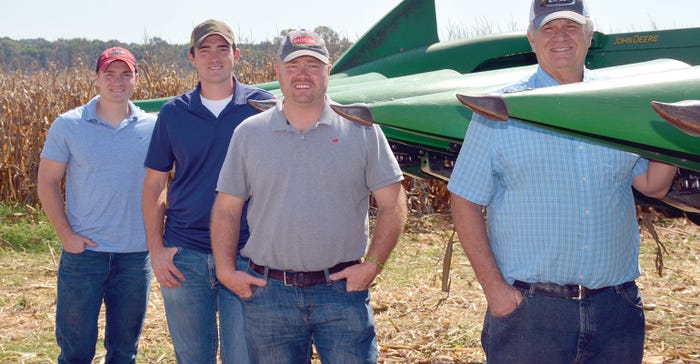
At harvest time, the Grills family, brothers Cody, Hunter, and Rusty, with their father, Jack, swap off combine duties to give each other breaks. “Doing anything for 10 hours straight, gets monotonous,” says Cody.
Rusty recalls his grandfather, A.J., filling used seed bags with soil to plug ditches and low areas to prevent erosion.
“He also went to the cotton gin, got truckloads of gin trash and spread it on weak soil to build it up.”
They use terraces, filter strips and silt basins. “We have built more than 100 silt basins,” says Hunter.
Reduced tillage plays a role. “We’re about 85 percent no-till and 10 percent reduced-till,” says Rusty.
“We have to strike a balance,” Hunter adds. “We still keep the fence rows clean but we want to keep some vegetation to serve as filter strips.”
Cover Crops
“We’re trying cover crops,” Rusty adds. They plant a mix with grasses, legumes and brassicas (turnips).
“We like cover crops,” Rusty adds. He says cover is particularly effective on highly erodible land where a trickle of water in just a year or two will create a ditch.
“We’re building organic matter, too,” Hunter says.
See also: Ninth generation feels privilege and responsibility for farm - Part one
Rusty says the triticale also helps the crop following it. “We can tell a difference when we plant the next crop.” He says triticale’s deep root system improves soil tilth.
They are now gearing up to participate in the BASF Monarch Challenge project that encourages farmers to sign up to receive a free milkweed starter kit and to grow the plants to increase biodiversity. They will set aside some acreage to plant milkweed to improve habitat for the butterflies.
Planting weeds may seem a bit odd, but they will manage the plots. Other weeds are not so welcome.
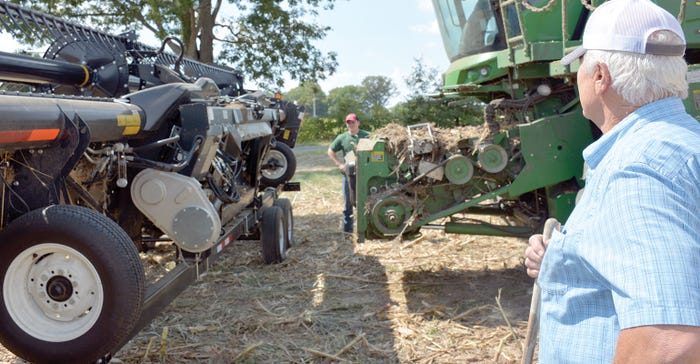
Changing heads on a combine used to take most all day, says Jack Grills. Now they make the switch in just a few minutes.
Weed management
They agree that managing weeds, especially glyphosate-resistant pigweeds, is a crucial part of maintaining and improving their land.
“We need dicamba and any other technology that comes along,” Rusty says.
They hope EPA approves dicamba re-registration soon, in time for 2019 decisions, and they hope application cutoff date will be reasonable. May 15, they say, is unrealistic.
It’s also unrealistic, they agree, to sacrifice efficiency for expansion or chasing high, unrealistic yields.
“I bought my first farm in 1975,” Jack says. “My father said, ‘don’t ever buy anything you can’t make better.’ My goal has always been to make things better for my children, not just on the farm but in their lives, their faith. If I don’t do that, I think I will have failed as a parent.”
Jack says his grandfather was poor but raised a family on four farms, all about 35 or 40 acres.
“There was hardly enough money to bury him when he died, but he was successful. He raised his family.”
He says his dad left him a farm in better shape than he found it. “I just built on what he left me,” Jack says.
“I have things better at 36 than dad did when he was 36,” Rusty says. “He had it better than my grandfather, who probably didn’t even have electricity when he was 36. We want to leave it better for our children.”
Jack has added acreage to the farm over the years, but insists that, “it’s important not to get too big too fast.”
“It’s the law of diminishing returns,” explains Hunter. “It’s best to farm what we can handle. We make sure we are as efficient as we can be.”
“We have to take every acre and do the best we can on it,” Jack says. “And the best ground available is the ground you already own.”
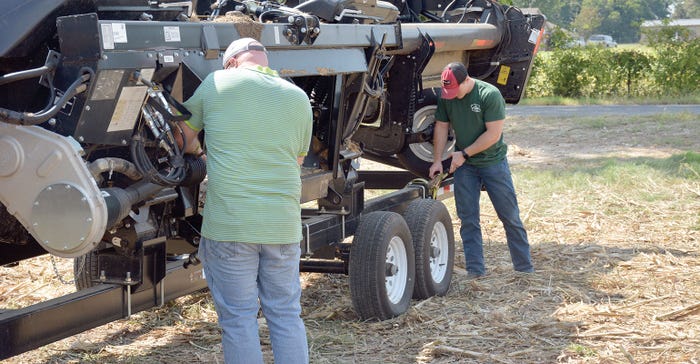
Rusty and Cody Grills prep the soybean header before attaching it to the combine.
It’s the Economics
Following conservative economic principles is essential, Rusty says. “Don’t spend more than you make. Some people spend so much that they mortgage something to continue. And they never know if they will get what they mortgaged back. We have to live within our means.”
Ann Grills, wife and mother, says she and Jack told all four children they could get a driver’s license and a vehicle when they turned 16 — but they had to pay for it themselves, in cash.
“They all did.”
When Rusty turned 14, Jack bought a used hay baler and the boys started their own baling business. They each made enough money to buy that first car.
“Jodi worked to earn money for her car, too,” Ann says.
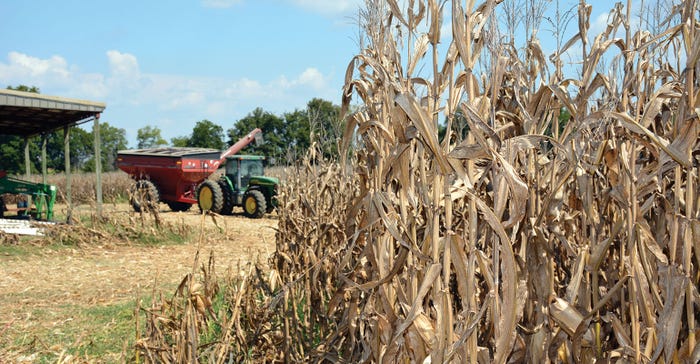
Corn shelling is under way on the Grills Family Dyer County, Tenn., farm.
The work ethic and the conservative economics was handed down, Jack says. “My grandfather lived through The Depression. He taught my dad and he taught me.”
“Our stewardship is honoring the lord in everything we do,” Hunter says.
He says Proverbs 13:22 is a good scripture for the legacy they are maintaining. “A good person leaves an inheritance for their children’s children; but a sinner’s wealth is stored up for the righteous.”
Through nine generations and counting, that inheritance has included parcels of land, but, more important, wealth far beyond yield numbers, acres and money in the bank. It’s a legacy of farm, family and faith.
About the Author(s)
You May Also Like






